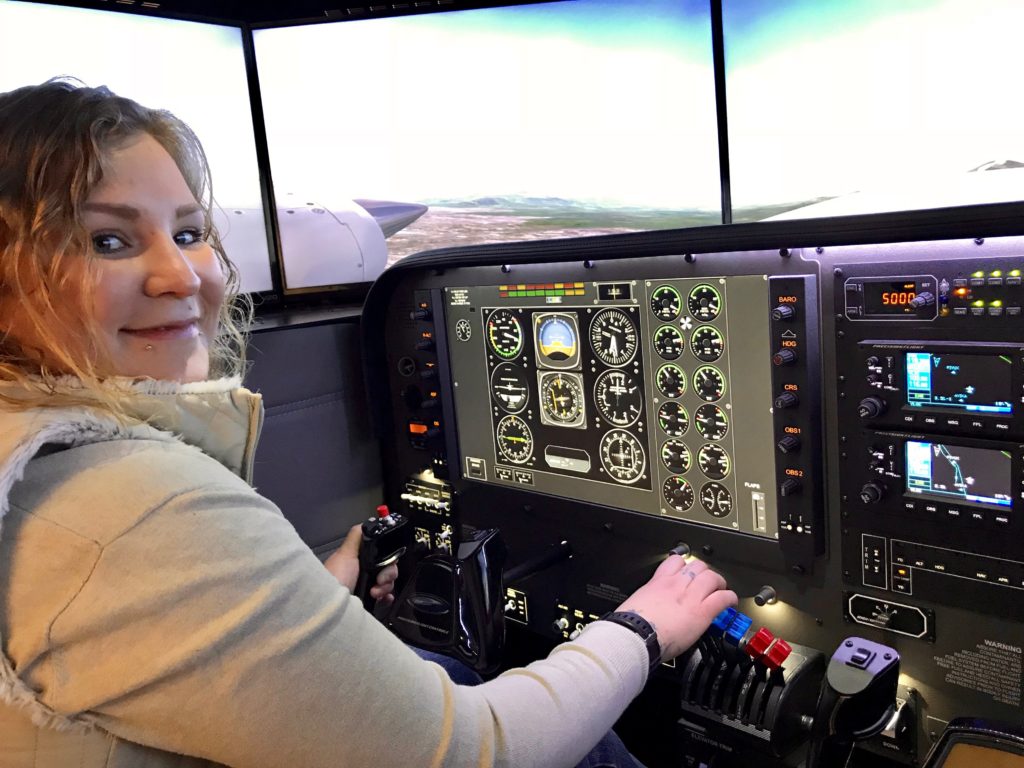Estimated reading time 4 minutes, 24 seconds.
Alkan Air Flight Academy in Whitehorse, Yukon, has acquired and installed a Precision Flight Controls DCX MAX flight simulator, the first of its kind in Northern Canada.

The simulator is programmed to mimic single-engine aircraft like the Cessna 172, Piper Cherokee and Cessna Caravan, as well as the twin-engine Piper Navajo, Piper Seneca, and Beechcraft Baron, and turboprops like the King Air 100, King Air 200, and Beechcraft 1900.
“Primarily we’re using it as a multi-engine trainer for our Seneca,” said Jenna Collee, chief flight instructor at Alkan Air Flight Academy.
“But we also occasionally use the single-engine. And then for our charter department, we use the King Air and the 1900 and the Caravan.”
Students have been training on the simulator since December, but it was officially launched at an open house on Feb. 19, 2018.
It cost about $250,000 to acquire and install, with a $100,000 contribution from the Canadian Northern Economic Development Agency (CanNor) and $100,000 from Yukon territorial government.
Alkan Air contributed another $46,463 toward the project, which will support the skills development of current and would-be pilots, and will provide training services to the aviation industry in Yukon and beyond.
“Any type of flight simulation training is beneficial, in that we can do things that we can’t do in the aircraft for safety reasons,” said Collee.
“We can adjust the weather to create ideal scenarios that may not be possible in real life. All of those are extremely beneficial.”
The DCX MAX includes dynamic control loading that simulates pitch and roll; as well as a five-panel, five-channel, 225-degree visual system; interchangeable start panels for single- or twin-engine aircraft; and interchangeable fuel selector panels.
“There’s an incredible number of emergencies that we can simulate,” said Collee.
“We can have individual instruments fail, we can have groups of instruments fail, we can have fires in the engine or in the cabin.
“And it’s very realistic, as opposed to having to simulate it in air, where we just do kind of a pretend game.”
The simulator is programmed to mimic landing on gravel airstrips, a common experience in the North. It is also programmed with Yukon’s mountainous terrain, and extreme weather conditions.
“The students all love it. It’s been quite valuable in our training so far,” said Collee.
“I hope that we’re able to get more similar technology, and it will improve the level of training that we’re able to give.
“But for now, I think this is an excellent start. I hope it benefits the students and the school, and increases our calibre of students.”
Alkan Air Flight Academy is a division of Alkan Air, a Whitehorse-based flight solutions company that offers charter services, third-party maintenance, and facilities and flight tracking.
Alkan Air’s fleet includes one Beech 1900, two Dornier 228s, one de Havilland DCH-3T Turbine Otter, one Beechcraft King Air 200, three Cessna 208B Grand Caravan, one Piper Chieftain, one Piper Seneca and three dedicated Beechcraft King Airs that serve as air ambulances for Yukon Emergency Medical Services.
Alkan Air Flight Academy also partners with Yukon College to offer an Aviation Management Development Program, where students complete flight training with Alkan Air while taking business courses at Yukon College.
“This new simulator is an investment in the future graduates of the Aviation Management diploma program,” said Dr. Karen Barnes, president and vice-chancellor of Yukon College, in a news release.
“It is an invaluable training tool that enables students to safely explore a range of challenging flight circumstances helping them become the calm, resourceful pilots the North, and Canada, needs.”